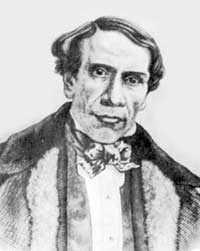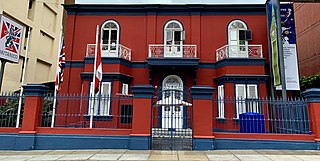
Inca Kola is a soft drink that was created in Peru in 1935 by British immigrant Joseph Robinson Lindley. The soda has a sweet, fruity flavor that somewhat resembles its main ingredient, lemon verbena. Americans compare its flavor to bubblegum or cream soda, and it is sometimes categorized as a champagne cola.

Croatian Peruvians are Peruvians of Croatian descent. Mostly settled in the Peruvian capital, Lima, Croatian-Peruvians have scattered throughout the vast metropolis, but are known to have established a strong community in the Miraflores District, where strong ties to the ethnic group still remain. Due to intermarriage, most Croatian-Peruvians are of mixed ancestry. Actual conversations in Croatian are common only within first generation immigrants. Although Croatian speech in Peru has been generally lost.
British Latin Americans are Latin Americans of British ancestry.

Italian Peruvians are Peruvian-born citizens who are fully or partially of Italian descent, whose ancestors were Italians who emigrated to Peru during the Italian diaspora, or Italian-born people in Peru. Among European Peruvians, Italians were the second largest group of immigrants to settle in the country. Italian immigration in Peru began in the colonial era, during the Spanish Viceroyalty of Peru.

French Peruvians(French: français-péruvien; Spanish: franco-peruano) are Peruvian citizens of French ancestry, or those who immigrated to Peru from France. The French were the fourth largest group of immigrants to settle in the country after the Spanish, Italians, and the Germans.
Peruvians of European descent, also known as White Peruvians. Traditionally, this group had been more dominant in the political, commercial, and diplomatic sectors of Peruvian society. According to the most recent 2017 census where ethnic self-identification was used, it makes up about 5.9% of the total population aged 12 years and above of Peru.

A Spanish Peruvian is a Peruvian citizen of Spanish descent. Among European Peruvians, the Spanish are the largest group of immigrants to settle in the country.

German Peruvians are Peruvian citizens of full or partial German ancestry. In general, the term is also applied to descendants of other German-speaking immigrants, such as Austrians or the Swiss, or to someone who has immigrated to Peru from German-speaking countries.

Victor Vaughen Morris was an American immigrant to Peru and businessman and bar owner best known for inventing the Pisco Sour, the national drink of Peru.

Arca Continental Lindley S.A. is a Peruvian company involved in the manufacturing, distribution and marketing of nonalcoholic beverages and the official bottler and distributor of all Coca-Cola products in Peru. The Lindley Corporation is best known for its creation and marketing of Inca Kola, the number one selling soft drink in Peru. The Lindley Corporation, located in the historic District of Lima, Peru, is also a major promoter of plastic recycling programs in Peru. Its president is Johnny Lindley Suarez.

"Lima de veras" is a song written in 1948 by Chabuca Granda. The song is a Peruvian waltz in the "música criolla" style. It was Granda's first published song and is regarded as one of her most important works.

The Agrarian Reform in Peru was a process of land reform redistribution initiated in the 1960s by struggles of rural workers (campesinos) for their land in the Cusco Region, and legally implemented under General Juan Velasco Alvarado in 1969 through three distinct laws. These land reform laws sought to redistribute large amounts of land that had once been owned by indigenous populations to the rural populations that lived and worked in the lands. The proposed laws promulgated in 1969 would attempt to change Peru´s agrarian infrastructure from being a system dominated by haciendas. Which was characterized by the semi-feudal relationships between haciendas owned by private Spanish patrones which employed peones, a large indigenous group, large cooperatives controlled by the Peruvian state, and areas of land owned indigenous communities that were recognized by the Peruvian government. The land reform was predominately focused on redistributing land from private haciendas to rural communities. For the former hacendados, the government of Peru issued agrarian bonds as compensation for land expropriation.

Teodomiro A. Gutiérrez Cuevas, also known by his pseudonym Rumi Maqui, was a Peruvian Army Major and Indigenous leader who led a rebellion in Puno in 1915. After his imprisonment, he escaped his prison in Arequipa in January 1917.

Juan Bustamante Dueñas, allegedly also known as Túpac Amaru III, was a Peruvian indigenous leader who led a rebellion that lasted from 1867 to 1868.

Peru–United Kingdom relations refers to the bilateral relations between the Republic of Peru and the United Kingdom of Great Britain and Northern Ireland. Relations between both countries date back to the British intervention in the Peruvian War of Independence.

Isabel María Povea Moreno is a Spanish historian who has specialized in social history and mining history of Spanish America, with special emphasis on the history of women in colonial mining.

The British–Peruvian Cultural Association, also known simply as the BRITÁNICO, is a private non-profit cultural association in Peru that teaches the English language and promotes a cultural integration between Peru and the United Kingdom.














